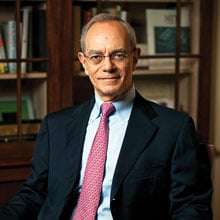From the President: Extraordinary Citizens
Dresselhaus, Solow win Presidential Medal of Freedom.
At MIT, we are used to the idea that our faculty members have long and impressive résumés, full of extraordinary distinctions. And we have the greatest respect for their achievements. As a community, however, we are not inclined to fanfare. But I hope that you will forgive me for departing from that tradition to make a fuss about one recent honor.

In November, the White House announced that two MIT faculty members had been awarded the Presidential Medal of Freedom: Institute Professors emeriti Millie Dresselhaus and Robert Solow. Dresselhaus, a physicist, materials scientist, and electrical engineer, laid the groundwork for much of today’s carbon-based nanotechnology. Solow, a Nobel laureate in economics, revolutionized our understanding of the key role innovation plays in economic growth. Both have been recognized with an array of exceptional honors, including their rank as Institute Professor, the highest distinction granted by the MIT faculty. But the Presidential Medal of Freedom is different. In a sense, it goes beyond any professional award, because it is the greatest civilian honor in the United States. In receiving this medal, Millie and Bob demonstrate that their approach to scholarship—bold, rigorous, highly creative, and actively applied to the problems of the world—represents citizenship in the highest sense. Although their fields are very different, in their work they both embody MIT’s distinctive mission: to bring knowledge to bear on the world’s great challenges, for the benefit of humankind. We could not be prouder to offer them the fanfare they deserve.
Keep Reading
Most Popular
Large language models can do jaw-dropping things. But nobody knows exactly why.
And that's a problem. Figuring it out is one of the biggest scientific puzzles of our time and a crucial step towards controlling more powerful future models.
The problem with plug-in hybrids? Their drivers.
Plug-in hybrids are often sold as a transition to EVs, but new data from Europe shows we’re still underestimating the emissions they produce.
How scientists traced a mysterious covid case back to six toilets
When wastewater surveillance turns into a hunt for a single infected individual, the ethics get tricky.
Google DeepMind’s new generative model makes Super Mario–like games from scratch
Genie learns how to control games by watching hours and hours of video. It could help train next-gen robots too.
Stay connected
Get the latest updates from
MIT Technology Review
Discover special offers, top stories, upcoming events, and more.